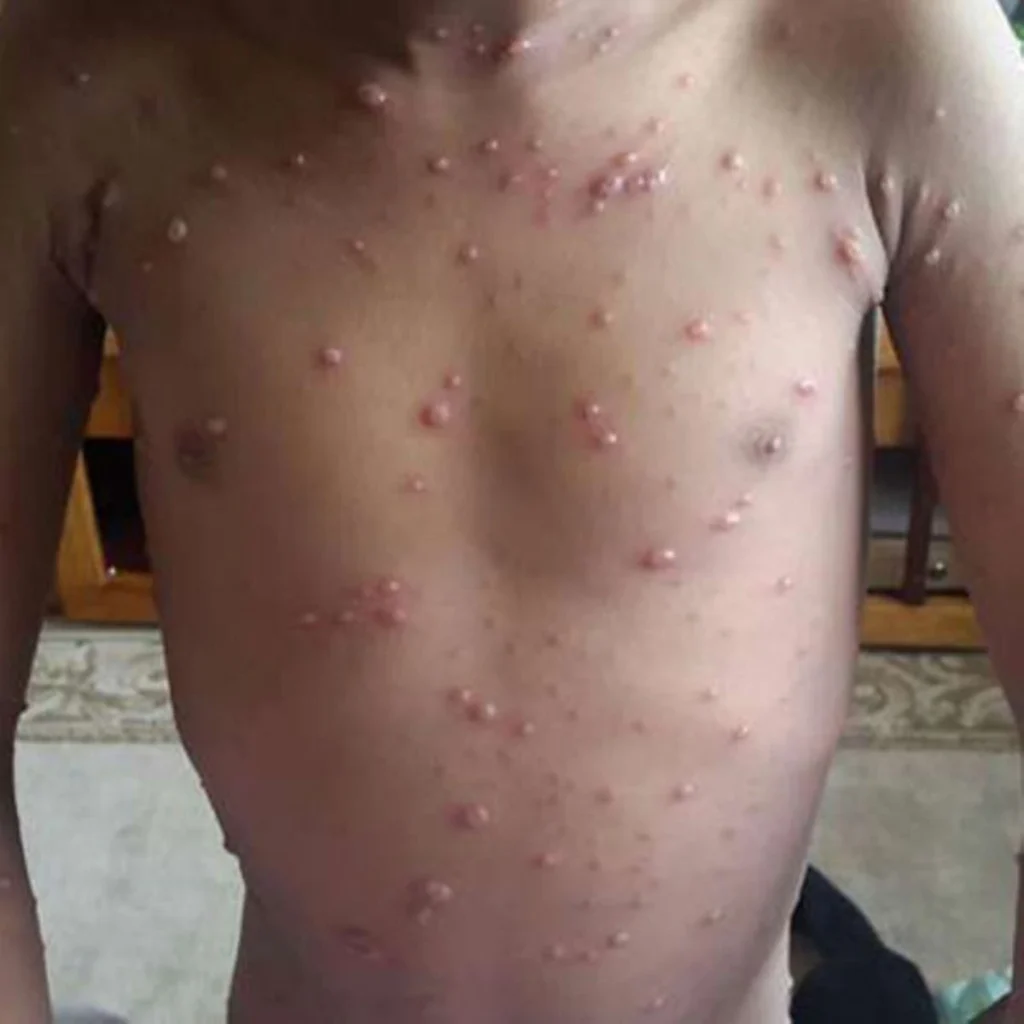Author's details
- Hakim A Abubakre
- BA (Hons) International Business Management, Msc Digital Marketing.
Reviewer's details
- Dr. Khashau Eleburuike
- MBBS (Ilorin) MSc. Global Health Karolinska Institute.
- Resident doctor in family medicine in Northen Sweden.

- Date Published: 2026-01-03
- Date Updated: 2025-03-19
Chickenpox (Varicella) in Children: A Guide for Sub-Saharan Africa
Key Messages
- Chickenpox is a highly contagious childhood illness that usually resolves on its own but can cause serious complications, especially in children with weakened immune systems.
- The disease starts with fever and tiredness, followed by an itchy, blister-like rash that spreads across the body.
- Home care includes relieving itching, managing fever with paracetamol (not aspirin), and keeping the child hydrated.
- Seek medical attention if there are breathing problems, persistent high fever, signs of dehydration, or skin infections.
- Vaccination is the best prevention, but good hygiene and isolation of infected individuals also help reduce spread.
Chickenpox, caused by the varicella-zoster virus (a type of herpes virus), is a common, highly contagious childhood illness. It manifests as an itchy, blister-like rash that eventually forms scabs. Though it is often mild, it can become serious in some cases. In sub-Saharan Africa, where vaccination rates are variable, the disease can spread quickly in overcrowded areas, particularly during cooler seasons such as winter or spring.
While chickenpox typically resolves on its own within 1-2 weeks, complications can occur, especially in children with weakened immune systems. Vaccination is the most effective prevention method, but it may not always be part of the national immunization schedule in all sub-Saharan countries.
Chickenpox symptoms usually begin 1-2 days before the appearance of the rash, and include:
- Fever and runny nose.
- Tiredness and a general feeling of being unwell.
- Loss of appetite.
- Headaches and mild aches.
The Rash:
- Begins as small, red, itchy bumps on the chest, back, and face, spreading to the rest of the body.
- Stages of rash progression:
- Red bumps that look like pimples.
- Bumps develop into fluid-filled blisters.
- Blisters break open and form open sores.
- Sores dry out, becoming brown scabs.
The rash can also appear inside the mouth, on the eyelids, or in the genital area. New spots may continue to develop as others blister or scab over, and the blisters typically last for about one week.
Managing chickenpox symptoms at home can ease discomfort:
- Relieve Itching:
- Use cool baths with baking soda or oatmeal to reduce itching.
- Apply calamine lotion to soothe the skin.
- Cool, wet compresses can help relieve itchiness.
- Keep nails short to prevent scratching, which can lead to infection and scarring.
- Wear loose, breathable clothing made of natural fibers.
- Manage Fever:
- Give paracetamol (acetaminophen) to reduce fever. Avoid using aspirin, as it may lead to serious complications in children with viral infections.
- Stay Hydrated:
- Encourage plenty of fluids, such as water or sugar-free popsicles, which can soothe mouth sores and prevent dehydration.
- Prevent Spread:
- Keep the infected child at home until all blisters have crusted over.
- Avoid contact with at-risk groups, including pregnant women, newborns, and people with weakened immune systems.
- Wash hands regularly and practice good hygiene to reduce the spread of the virus.
Seek medical care if your child:
- Has difficulty breathing or experiences chest pain.
- Shows signs of dehydration.
- Develops a high fever that persists despite using paracetamol.
- Has a rash that spreads to the eyes or causes extreme pain in muscles.
- Develops skin infections around the blisters (red, hot, or painful).
- Has new blisters or spots appearing after 7 days.
- Experiences a fever of 38.0°C (100.4°F) for more than 5 days, or a temperature of 39°C (102.2°F) or above in children aged 3-6 months.
For pregnant women or those with weakened immune systems, immediate medical attention is required if exposed to chickenpox, as they are at higher risk of severe complications.
- Vaccination: The chickenpox vaccine is the most effective form of prevention. Two doses are recommended—one between 12-15 months and a second between ages 4-6 years. In regions where vaccination is available, it may be combined with the measles, mumps, rubella, and varicella (MMRV) vaccine.
- Isolation: Keep individuals with chickenpox isolated from others, especially those at risk of complications, until all blisters have crusted over.
- Good Hygiene: Regular hand washing and maintaining clean environments can help prevent the spread of the virus.
- Avoid Contact with Infected People: If unvaccinated, high risk individuals and exposed, seek medical attention immediately. Antiviral medication or varicella-zoster immune globulin may be offered to people at high risk of severe chickenpox.
In sub-Saharan Africa, chickenpox can spread rapidly, especially in areas with limited access to vaccines and healthcare. Understanding the symptoms, managing the condition at home, and preventing its spread through vaccination and good hygiene can help reduce the severity of chickenpox in children. Access to medical care is crucial for those at higher risk of complications.
- Ayoade F, Kumar S. Varicella-Zoster Virus (Chickenpox) [Updated 2022 Oct 15]. In: StatPearls [Internet]. Treasure Island (FL): StatPearls Publishing; 2025 Jan-. Available from: https://www.ncbi.nlm.nih.gov/books/NBK448191/
- Tunbridge AJ, Breuer J, Jeffery KJ. Chickenpox in adults–clinical management. Journal of Infection. 2008 Aug 1;57(2):95-102.
- Presti CL, Curti C, Montana M, Bornet C, Vanelle P. Chickenpox: an update. Médecine et Maladies Infectieuses. 2019 Feb 1;49(1):1-8.
- https://www.google.com/search?q=chickenpox+in+children&rlz=1C5CHFA_enGB894GB894&oq=&gs_lcrp=EgZjaHJvbWUqCQgBECMYJxjqAjIJCAAQIxgnGOoCMgkIARAjGCcY6gIyCQgCEC4YJxjqAjIJCAMQIxgnGOoCMgkIBBAuGCcY6gIyCQgFECMYJxjqAjIJCAYQIxgnGOoCMgkIBxAuGCcY6gLSAQkxNjg3ajBqMTWoAgiwAgHxBQE1GMJ12Nym&sourceid=chrome&ie=UTF-8
- https://www.nhs.uk/conditions/chickenpox/
- https://www.nhsinform.scot/illnesses-and-conditions/infections-and-poisoning/chickenpox/
- https://www.hopkinsmedicine.org/health/conditions-and-diseases/chickenpox-in-children
- https://www.google.com/search?q=symptoms+of+chickenpox+in+children&rlz=1C5CHFA_enGB894GB894&oq=Symptoms+of+ch&gs_lcrp=EgZjaHJvbWUqDQgDEAAYkQIYgAQYigUyBggAEEUYOTIPCAEQABhDGLEDGIAEGIoFMg0IAhAAGJECGIAEGIoFMg0IAxAAGJECGIAEGIoFMg0IBBAAGJECGIAEGIoFMgwIBRAAGEMYgAQYigUyBwgGEAAYgAQyCggHEAAYsQMYgAQyBwgIEAAYgAQyBwgJEAAYgATSAQoxNDM1MmowajE1qAIIsAIB8QWXoZzdDaPOs_EFl6Gc3Q2jzrM&sourceid=chrome&ie=UTF-8
- https://www.google.com/search?q=Self+care+for+Chickenpox&rlz=1C5CHFA_enGB894GB894&oq=Self+care+for+Chickenpox&gs_lcrp=EgZjaHJvbWUyBggAEEUYOTIKCAEQABgKGBYYHjIICAIQABgWGB4yDQgDEAAYhgMYgAQYigUyDQgEEAAYhgMYgAQYigUyDQgFEAAYhgMYgAQYigUyBwgGEAAY7wUyBwgHEAAY7wUyBwgIEAAY7wXSAQoyNjk3MmowajE1qAIIsAIB8QVpg-An6xrwzPEFaYPgJ-sa8Mw&sourceid=chrome&ie=UTF-8
- https://www.google.com/search?q=when+to+seek+medical+attention+for+chickenpox&rlz=1C5CHFA_enGB894GB894&oq=When+to+seek+medical+attention+for+chic&gs_lcrp=EgZjaHJvbWUqBwgBEAAYgAQyBggAEEUYOTIHCAEQABiABDIICAIQABgWGB4yDQgDEAAYhgMYgAQYigUyDQgEEAAYhgMYgAQYigUyDQgFEAAYhgMYgAQYigUyDQgGEAAYhgMYgAQYigXSAQo0Njk3NWowajE1qAIIsAIB8QWo8hF8BaB8RA&sourceid=chrome&ie=UTF-8
- https://www.google.com/search?q=prevention+of+chickenpox&rlz=1C5CHFA_enGB894GB894&oq=Prevention+of+chickenpox&gs_lcrp=EgZjaHJvbWUqDAgAEAAYQxiABBiKBTIMCAAQABhDGIAEGIoFMgwIARAAGBQYhwIYgAQyBwgCEAAYgAQyDAgDEAAYFBiHAhiABDIHCAQQABiABDIHCAUQABiABDIHCAYQABiABDIHCAcQABiABDIHCAgQABiABDIHCAkQABiABNIBCjI0MTM4ajBqMTWoAgiwAgHxBYm545bORt0U8QWJueOWzkbdFA&sourceid=chrome&ie=UTF-8
